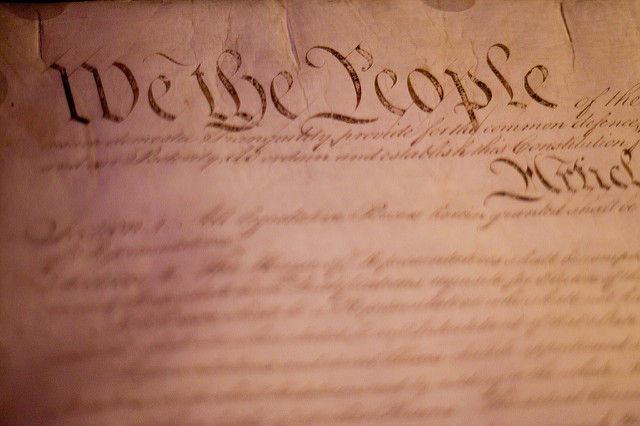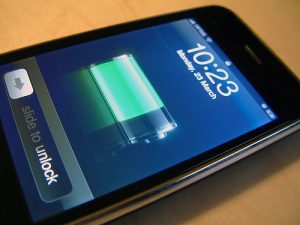
There's been ongoing dialogue about Apple's upcoming legal strategy in its battle with the government about whether it should be required to comport with a court order mandating that the Cupertino gadget maker assist the authorities in accessing a locked, encrypted iPhone used by one of the San Bernardino shooters. One legal angle that has largely been overlooked is the Fifth Amendment.
Here at Ars, we already produced a lengthy feature focusing on the All Writs Act of 1789, a law invoked by judges to order somebody to do something despite there being no law requiring them to do so. That ancient law is at the heart of the government's argument demanding that Apple write custom software to assist the authorities in unlocking the encrypted iPhone used by killer Syed Rizwan Farook, who participated in a shooting spree in December that killed 14 people. Our Ars story overlooked a Fifth Amendment defense and largely discussed a nuanced three-pronged approach to how Apple will defend its stance of not wanting to provide assistance to the government's request. If Apple is ultimately ordered to comply, Apple chief Tim Cook said it would set a "dangerous precedent."
Then on Tuesday, Bloomberg wrote that Apple will also argue in its legal papers to be filed by Friday that computer code and its cryptographic autograph are protected speech under the First Amendment and that the government cannot compel speech by Apple. Bloomberg reported:
Apple is expected to argue in federal court that code should be protected as speech. The company is fighting a government order requiring it to write software to help the Federal Bureau of Investigation unlock an iPhone used by one of the San Bernardino shooters. Apple views that as a violation of its philosophy. Just as the government can’t make a journalist write a story on its behalf, according to this view, it can’t force Apple to write an operating system with weaker security.
And here's where Apple's upcoming legal position gets even more dicey. One legal angle Apple is also expected to assert is that the Fifth Amendment protects it from having to comport with the order. That's according to Apple sources familiar with its strategy. For the general public, the Fifth Amendment is best known for the privilege against compelled self-incrimination. It's the amendment invoked by Martin Shkreli, the Big Pharma bad boy who is at the center of a securities fraud investigation and is refusing to assist Congress in probing pharmaceutical prices.
But the Fifth Amendment goes beyond the well-known right against compelled self-incrimination. The relevant part for the Apple analysis is: "nor be deprived of life, liberty, or property, without due process of law; nor shall private property be taken for public use, without just compensation."
The idea here is that the government is conscripting Apple to build something that it doesn't want to do. That allegedly is a breach of its "substantive due process." The government is "conscripting a company's employees to become agents for the government," as one source familiar with Apple's legal strategy told Ars. The doctrine of substantive due process, according to Cornell University School of Law, holds "that the 5th and 14th Amendments require all governmental intrusions into fundamental rights and liberties be fair and reasonable and in furtherance of a legitimate governmental interest."

How invoking the Fifth Amendment will play out in the Apple flap is anybody's guess. The government wants access to the phone because it believes it might find information connected to terrorism. "Maybe the phone holds the clue to finding more terrorists. Maybe it doesn’t. But we can't look the survivors in the eye, or ourselves in the mirror, if we don't follow this lead," FBI Director James Comey said.
Alex Abdo, an American Civil Liberties Union staff attorney, said the civil rights group is to file a friend-of-the-court brief in the dispute that cites the Fifth Amendment in Apple's defense. "If this legal argument sounds novel, it's because the government's claim is unprecedented," Abdo said in a telephone interview.
Sure, the nation's telecoms assist the government all the time by honoring warrants for wiretaps, call records, and other information. But what makes the iPhone dispute different, Abdo said, is that "the telecoms already have the information the government is after." In the Apple case, the iPhone maker is being asked to create software to defeat its own locking security apparatus.
If Apple is ultimately forced to comply, that new firmware it develops would remove a possible automatic wipe feature on the phone if a passcode is incorrectly entered 10 times, and it would remove a delay between passcode attempts intended to make brute-force entry more difficult. That would then pave the way for the government to enter PIN codes in rapid succession until it gained access to the phone. A court hearing has been scheduled for March 22 in Riverside, California.
reader comments
311